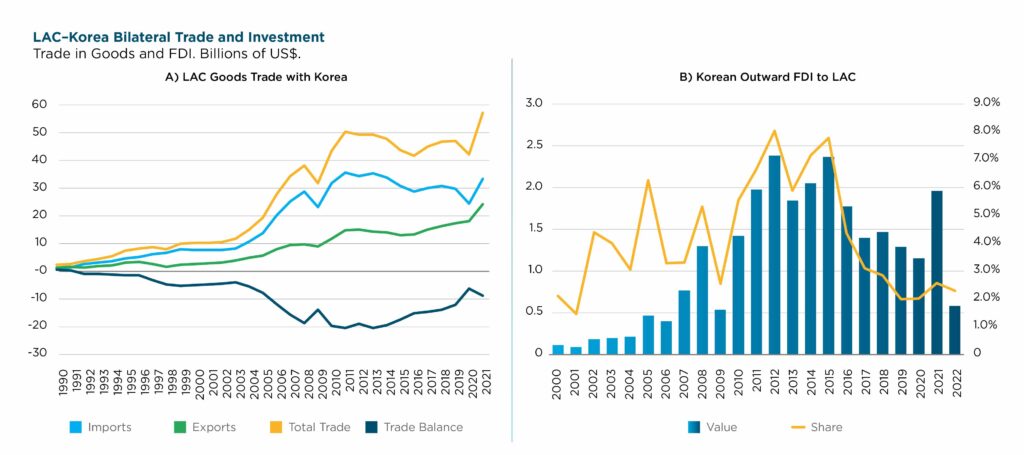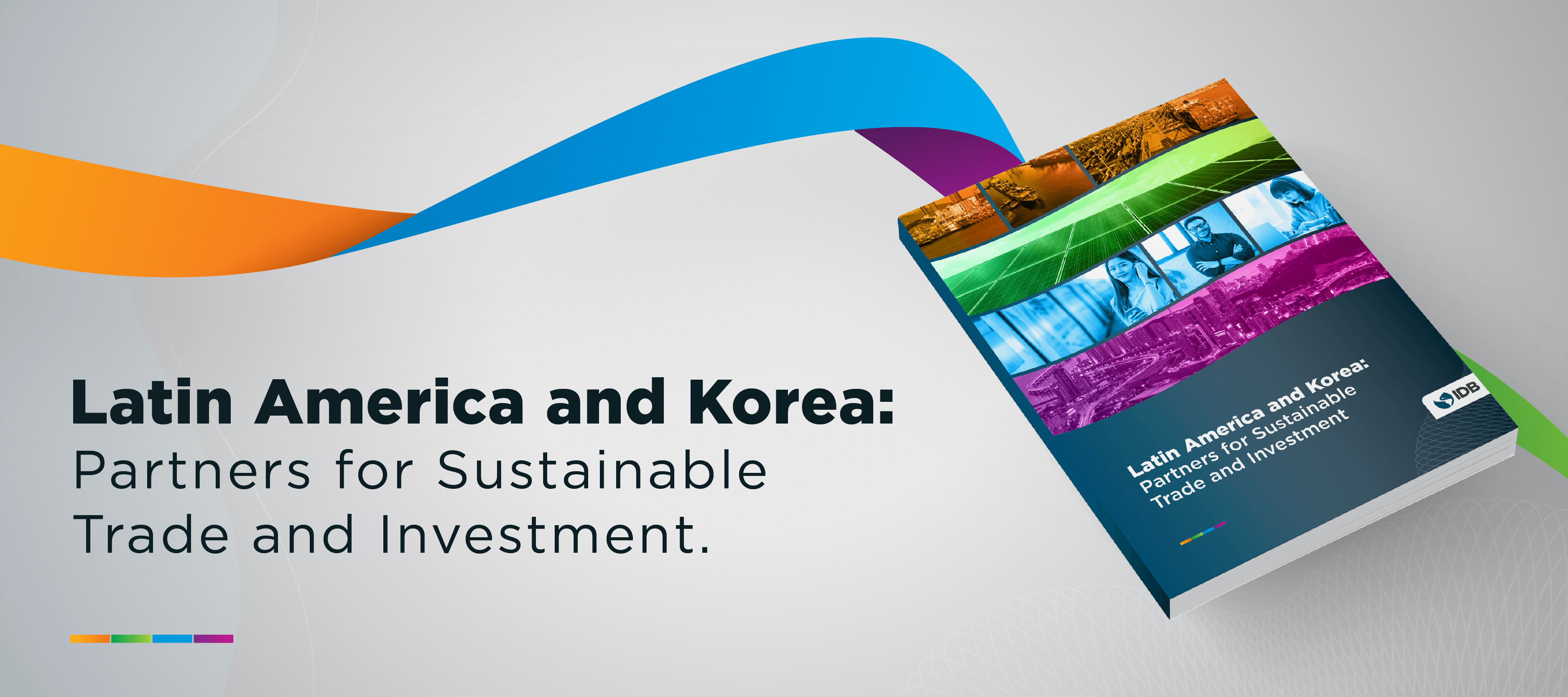Trade and investment relations between Korea and Latin America and the Caribbean (LAC) have come a long way. As the two economies embraced trade liberalization in the early 1990s, their bilateral trade grew at an impressive annual rate of 11.5%—reaching a record high of US$57 billion in 2021. The trade boom came along with US$26 billion in investments by Korean firms in the region since 2000 (Figure 1).
In a new IDB report, launched on the sidelines of the 6th Korea-LAC Business Summit, we argue that these vibrant trade and investment ties have the potential to create more robust bilateral and global value chains that can help solve some of the major global challenges in food, energy and climate.
The study examines trade and investment trends by country and sector, logistical challenges, as well as opportunities in agriculture, the digital economy and energy, among others, by presenting new data and case studies

Note: Based on imports and exports reported by 26 LAC countries. *Values for 2022 represent outflows for the first quarter of the year.
Old and new challenges
Despite these impressive numbers, longstanding challenges remain, and new ones are emerging. The former is mainly about lingering trade barriers—tariffs peaks, particularly for agricultural goods, as well as costly customs procedures and high logistics costs. The latter arises from the growing, interrelated sanitary, food, energy, and climate crises — which may easily lead countries to fall for ineffective and costly protectionist solutions.
We argue, though, that, both economies have a set of policies, institutions, and comparative advantages that, if reinforced and leveraged by trade and cooperation, can turn these challenges into bilateral and global opportunities for inclusive and sustainable growth.
Closing the food gap
LAC is the world’s largest net exporter of food and agricultural goods (15% of the world’s exports). It is also one of the most productive regions, with the potential to stabilize and lower international food prices and close the world’s growing “food gap”, benefiting consumers in Korea and elsewhere.
However, closing the “food gap” cannot occur at the expense of the planet. It will have to come mostly from innovation rather than land use and deforestation, which already account for 18% of the region’s carbonemissions. The LAC-Korea partnership can make a significant contribution by leveraging Korea’s world-renowned innovation system to boost the region’s already considerable effort to harness new digital and microbiology technologies to increase agricultural yields.
Fostering clean energy
LAC has one of the cleanest energy matrices in the world, with nearly 30% of its energy coming from renewable sources– a share significantly higher than those of the world (14%) and Korea (4%). The region is also well positioned in the supply of minerals that are critical in this transition—it has some of the highest world reserves of copper, lithium, nickel, silicon, and rare earth metals.
This abundant supply of clean energy gives the region an important comparative advantage in the challenges of abating carbon emissions from energy-intensive industries such as steel, aluminum, and cement, and in producing zero-emission fuels such as green hydrogen. Korea, in turn, has a strong foothold in value chain segments that can shift energy demand toward renewables, such as the production of solar panels, lithium batteries and electric vehicles.
Harnessing the digital transformation
On the digital front, Korea, as a major supplier of information technology, can be a critical partner in LAC’s digital transformation. This transformation also has the potential for trade and investment creation by lowering information, logistics, and regulatory costs, as well as by enabling new trade modalities (e-commerce) and varieties (digitally transmitted goods and services).
To turn these opportunities into results will require engagement form both the private and public sectors. Korean firms are already present in the extraction and processing of lithium in Argentina as well as in the production of electrical vehicles auto parts in Mexico. Deeper and broader trade agreements are needed to lay the groundwork for further investments and address environmental and labor concerns.
The vital role of cooperation
While markets and the private sector have been the main drivers of the relationship, they clearly benefited from a prolific intergovernmental cooperation. Since 2008, the flow of Korea’s development assistance to the region has reached US$1.6 billion in grants and loans.
A significant share of this assistance was financed and leveraged through the IDB (US$550.6 million since 2012) in areas such as innovation, poverty reduction, private-sector development, and public capacity-building. Co-financing of loans for infrastructure projects focused on sustainability, sanitation, and digital services, as well as knowledge sharing programs are also an important aspect of development cooperation with the IDB.
All these efforts are critical for the relationship to meet the economic, social, and environmental challenges of a fast-changing world economy.
Korea-LAC Business Summit
Since 2007, the Inter-American Development Bank and the Korean government have held the Korea-LAC Business Summit every two to three years, bringing together high-level public and private sector speakers from both regions, as well as a significant group of Korean and Latin American and the Caribbean companies. The previous Summit took place in 2019.
The Summit was held in Seoul this year on September 29-30, during which government officials and private sector leaders from both regions discussed the importance of strengthening social and economic cooperation. The event covered a wide range of topics, including the Korea-LAC strategic trade and investment agenda, opportunities for collaboration to combat climate change, and embracing digital transformation, among others.


Leave a Reply